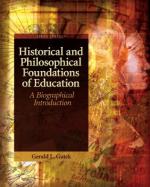
|
| Name: _________________________ | Period: ___________________ |
This test consists of 15 multiple choice questions and 5 short answer questions.
Multiple Choice Questions
1. The philosophy contained ___ main themes.
(a) 5.
(b) 3.
(c) 2.
(d) 4.
2. Erasmus worked at which prestigious university?
(a) Oxford.
(b) Cambridge.
(c) Yale.
(d) Harvard.
3. One of the people most well known for educational reform was:
(a) Thompson.
(b) Williams.
(c) Jenkins.
(d) Mann.
4. What were the individual regions in Greece called?
(a) Divisons.
(b) Hamlets.
(c) Sectors.
(d) City-states.
5. Who is known as the Proponent of International Education?
(a) Churchill.
(b) Plato.
(c) Jefferson.
(d) Comenius.
6. When did this person live?
(a) 1466-1536.
(b) 1436-1506.
(c) 1486-1556.
(d) 1446-1566.
7. Alexander the Great conquered many regions in which empire?
(a) Ottoman.
(b) Roman.
(c) Persian.
(d) Greek.
8. Aquinas chose to study the works of which great philosopher?
(a) Plato.
(b) Sophocles.
(c) Aristotle.
(d) Confucius.
9. Who was known as the Scholastic Theologian?
(a) Plato.
(b) Mann.
(c) Aquinas.
(d) Montessori.
10. What is the meaning of B.C.E.?
(a) Before the Common Era.
(b) Before Christian Era.
(c) Before Christian Existence.
(d) Before Common Existence.
11. Comenius was exiled to which country?
(a) Turkey.
(b) Poland.
(c) India.
(d) Russia.
12. Alexander the Great conquered the known world during which period?
(a) 336 to 323 B.C.E.
(b) 333 to 311 B.C.E.
(c) 331 to 316 B.C.E.
(d) 320 to 328 B.C.E.
13. In which city did this event take place?
(a) Wittenberg.
(b) London.
(c) Naples.
(d) Bologna.
14. The Catholic Church used Plato's philosophies to maintain influence during which period?
(a) Modern.
(b) Renaissance.
(c) Medieval.
(d) Post-modern.
15. Which group used Plato's structure?
(a) Quakers.
(b) Ottoman Empire.
(c) Protestant Reformists.
(d) Catholic Church.
Short Answer Questions
1. The emperor was thrown out of a window and landed in a pile of ____.
2. Gutek states that Enlightenment brought _________.
3. What term was developed for youth education?
4. Gutek assumes that educators interacted with which of the following?
5. What was the name of the emperor involved in the war?
|
This section contains 268 words (approx. 1 page at 300 words per page) |

|




